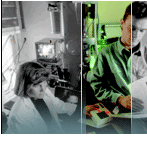|
|
|
| Home > Programs > Technical > Photonics > NATO ARW | |||||
| Technical | |||||
|
|||||
|
Photonics
2004 27/05/2004 NATO Advanced Research Workshop, Sept. 21-25, 2004, Ottawa, Ontario, CanadaNATO Frontiers in Planar Lightwave Circuit Technology: September 21-25, 2004 **IMPORTANT INFORMATION FOR PARTICIPANTS!** The NATO Advanced Research Workshop will address the scientific and technical challenges encountered along the path from design and simulation to fabrication and qualification of planar lightwave circuits that incorporate these new optical technologies and address the expanding range of applications. The workshop will bring together internationally recognized photonics experts from university, government, and industrial research organizations to provide a critical review of the existing knowledge, identify key areas for future research and product development, and explore emerging applications in communications, information technology, and in the health, defence and security sectors. Areas of Interest Scientific Directors Scientific Secretary Location Participation Cost Organizing Committee Speakers Workshop Format Invited talks: Each talk will review a particular subject and discuss the related design, simulation and fabrication challenges, as well as new promising directions. The speakers will also discuss in depth practical examples demonstrating successful and outstanding design, simulation and fabrication experiences related to the topic they are presenting. This will make the discussions practically oriented and meaningful. Focus sessions: The focus sessions will be informal discussions of practical issues in the design, simulation, fabrication and testing of planar lightwave circuit devices. The discussions will be led by experts in the focus topics. Examples drawn from the invited lectures will be used to generate discussions on real life issues in optical design and state-of-the-art micro-fabrication techniques. Focus session topics: Simulation and modeling issues; Micro-fabrication: Mask layout design, lithography and processing; Bio-sensing techniques and devices Workshop participants are invited to bring in-house software simulation tools for demonstration purposes. Interest groups will be created that will explore some of the design and simulation steps in new ways using both in-house and commercial software simulation tools provided by key speakers and participants. These sessions will generate many practical questions concerning the design, simulations, practical feasibility, fabrication challenges, commercial versus in-house simulation tool issues, etc. Interest groups will prepare reports summarizing the key findings during the running of the workshop. The finalized interest group reports will be part of the book published as a result of the workshop. Roundtable discussion topics Contact: |
|||||
| :: Printable Version :: :: Copyright © 2025 :: Vitesse Re-Skilling Canada Inc. :: |
|||||
|
|
|||||
|
||||||
|
||||||
